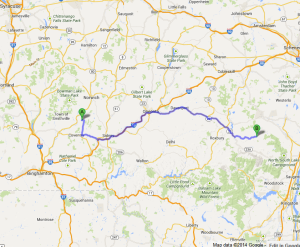 I’ve been thinking a lot about resolutions over the past couple of weeks.
I’ve been thinking a lot about resolutions over the past couple of weeks.
I like to set resolutions. I know some people don’t. But my thinking is very much along the lines of Sarah Hoyt’s, as she blogs about it here. Humans, she writes, “live by ritual and symbols as much as by concrete things . . . I use the rituals and the dates and the symbolic turning points as a fixed point off which to rappel and change my direction.”
[T]here is a dreadful weight of inertia to human life. Things-as-you’ve-always-done them become established in your mind and you end up doing them the exact same way over and over again, even if you hate it. It’s kind of like trying to swim in a soaked overcoat. And in this case, the habits formed during this year are the kind that, like that soaked overcoat, will be the end of me, if I don’t change them.
Exactly. Which is why resolutions can feel good. They can imbue your life with a sense of “getting somewhere,” of having some measure of control or at least influence on your destiny.
Only if you are kind to yourself about them, however. As Dean Wesley Smith notes in this post about setting writing goals, when it comes to goals, it’s important to be flexible about how we define “success.” If you set an “extreme” goal, he advises, “have fall-back success levels.” Understand that missing a goal doesn’t necessarily mean you’ve failed.

Er … no.
Seven of my eight 2013 resolutions were writing goals, and guess what: they were all extreme. I didn’t meet any of them. But I made substantial progress on three. So out of kindness to myself, I hereby christen 2013 a success :-)
And also out of kindness to myself, I’m going to be careful about my 2014 resolutions.
I realize, in retrospect, that the resolutions I made last year set me up to fail not only because they were extreme, but because meeting them depended too much on things outside my control.
Without going into too many personal details: the daily claims on my attention are real. I’m a mother. I have bills to pay. Etc.
The time and energy I can devote to writing fiction are limited. That’s a fact. And if my resolutions don’t accommodate that fact, I’m doomed to miss them. So:
Lesson #1. Don’t set goals/resolutions that are too vulnerable to factors I can’t control.
So how do you get to goals/resolutions that are within your control? Continue reading →





